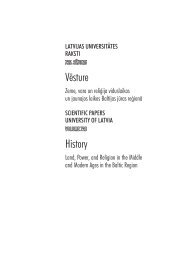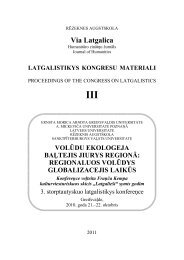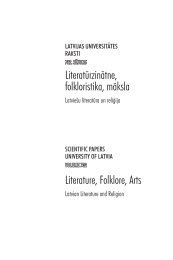Untitled
Untitled
Untitled
You also want an ePaper? Increase the reach of your titles
YUMPU automatically turns print PDFs into web optimized ePapers that Google loves.
14 LITERATÛRZINÂTNE, FOLKLORISTIKA, MÂKSLA<br />
mundane nature. Purely human and even noble is Karna’s attitude to the three older<br />
Pândavas after he hears from his mother Kuntî that Judhisthitira, Bhîmasena and<br />
Arjuna are his half– brothers. Karna promises to her: “I shall not kill such of your<br />
sons as are capable of being withstood and killed by me, in the battle. There are<br />
Yudhisthira, Bhîma and the twins, in fact everyone save Arjuna; Arjuna alone in the<br />
army of Yudhisthira is worthy to fight with me. Having killed Arjuna I shall achieve<br />
a reputation for great prowess; or being myself killed by Savyasachin I shall be endued<br />
with renown.” 22 . “Mahâbhârata”, reflecting, indeed, natural human weaknesses<br />
as much as merits, may not always be an example of military nobleness. Yet Manu<br />
asks any soldier: “Fighting in a battle, he should not kill his enemies with weapons<br />
that are concealed, barbed or smeared with poison or whose points blaze with fire.<br />
He should not kill anyone who has climbed on a mound, or an impotent man, or<br />
whose hair is unbound, or anyone who is seated or who says: “I am yours”; nor anyone<br />
asleep, without armour, naked, without a weapon, not fighting, looking on, or<br />
engaged with someone else; nor anyone whose weapons have been broken, or who is<br />
in pain, badly wounded, terrified, or fleeing– for he should remember duties of good<br />
men.’’ 23 . Is this not purely wordly ethics? One only should note: if such injunctions<br />
were at least partly observed in the many battles Indian kings fought against each<br />
other, then that was something positively and humanely unique in world history. Especially<br />
in so very ancient times.<br />
As one could expect, earthly aims in human life most ardently are defended by<br />
Kautilya in his famous “Arthashâstra”, written in the beginning of our era. After declaring<br />
that it is necessary for the people to fix the bounds of the Aryan rule of life,<br />
to establish securely the varnas and the stages of life, follow the assertion that material<br />
well–being alone is supreme. We meet with phrases like “wealth is the root of<br />
virtue”, “virtue is attained by wealth and wealth by virtue”, “morality as means to<br />
serve political ends”, “strengh is power, success is happiness”. Duties common to all<br />
are: abstaining from injury (to living beings), truthfulness, uprightness, freedom from<br />
malice, compassionatness, and forbearance.<br />
Even more than in “Arthashâstra”, whose influence on the Hindu’s everyday life<br />
may be very much questioned, worldly values predominate in the wonderful beast<br />
fables of “Pancatantra” and “Hitopadesha”. Their philosophy, which must have been<br />
true to life, was acceptable not only to Indians, but also to many other nationalities.<br />
Not in vain in Europe it was once thougt that all fairy–tales originated in India.<br />
It is extremely easy to find evidences in literature that women were regarded to<br />
be much lower than men and that wives could be treated as something like the property<br />
of their husbands. In this connection Manu – a specific authority on the questions<br />
of marriage and family life– says: “Horses and chariots, elephants, parasols,<br />
money, grain, livestock, women, all sorts of things and non–precious materials belong<br />
to the man who wins them.” 24 We know well how the widows of the three upper<br />
varnas are treated even now or what the child marriage means for a girl. At the same<br />
time, if we regard Hinduism as an ancient creed, it is obvious that women’s position<br />
in China or Greece, for example, was hardly better. The very humane Indian injunction<br />
not to kill a woman in any circumstances seems to have been strictly observed.<br />
Bhîshma allowed himself to be slaughtered because he thought that he had to fight a<br />
person whom he knew as a woman. For killing of a woman capital punishment is

















